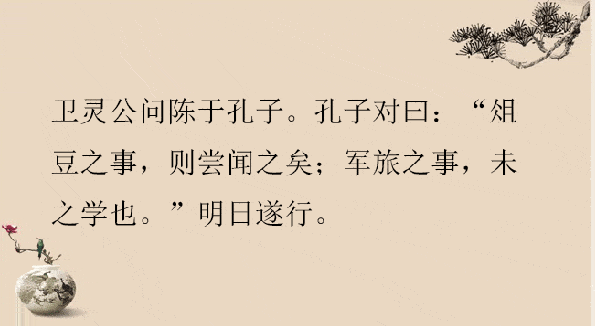The Master said, "The determined scholar and the man of virtue will not seek to live at the expense of injuring their virtue,
子曰:“志士仁人无求生以害仁,
They will even sacrifice their lives to preserve their virtue complete."
有杀身以成仁。”
Tsze-kung asked about the practice of virtue, the Master said, "The mechanic, who wishes to do his work well, must first sharpen his tools.
子贡问为仁,子曰:“工欲善其事,必先利其器。
When you are living in any state, take service with the most worthy among its great officers, and make friends of the most virtuous among its scholars."
居是邦也,事其大夫之贤者,友其士之仁者。”
Yen Yuan asked how the government of a country should be administered,
颜渊问为邦,
the Master said, "Follow the seasons of Hsia, ride in the state carriage of Yin,
子曰:“行夏之时,乘殷之辂,

wear the ceremonial cap of Chau. Let the music be the Shao with its pantomimes.
服周之冕,乐则《韶》、《舞》。
Banish the songs of Chang, and keep far from specious talkers. The songs of Chang are licentious, specious talkers are dangerous."
放郑声,远佞人。郑声淫,佞人殆。”
The Master said, "If a man take no thought about what is distant, he will find sorrow near at hand."
子曰:“人无远虑,必有近忧。”
The Master said, "It is all over! I have not seen one who loves virtue as he loves beauty."
子曰:“已矣乎!吾未见好德如好色者也。”
The Master said, "Was not Tsang Wan like one who had stolen his situation?
子曰:“臧文仲其窃位者与?
He knew the virtue and the talents of Hui of Liu-hsia, and yet did not procure that he should stand with him in court."
知柳下惠之贤而不与立也。”


